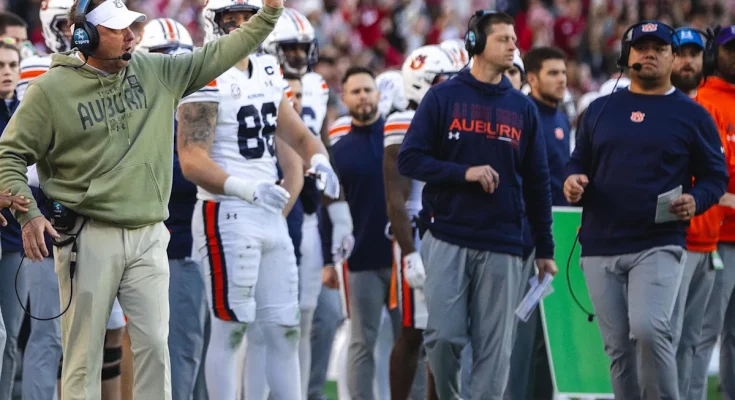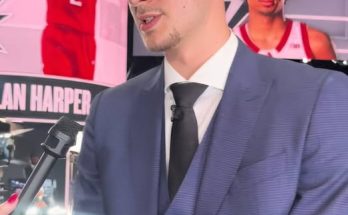Auburn ‘Sold a Bill of Goods’ According to ESPN’s Paul Finebaum
Paul Finebaum, ESPN’s most prominent college football analyst, is never one to shy away from bold statements, and his latest comments about Auburn football have sent shockwaves through the fanbase. Speaking on his daily radio show, Finebaum claimed that Auburn had been “sold a bill of goods” in recent years, suggesting that the program has been misled—whether by coaching hires, administrative decisions, or unrealistic expectations. His remarks have sparked debate among fans and analysts alike, with some agreeing that Auburn has struggled to find consistency while others defend the program’s efforts to compete in the cutthroat SEC.
### The Context of Finebaum’s Criticism
Finebaum’s critique didn’t come out of nowhere. Auburn, a program with a rich history and a passionate fanbase, has experienced a rollercoaster of highs and lows over the past decade. The Tigers won a national championship in 2010 under Gene Chizik, only to see him fired two years later after a disastrous 3-9 season. Gus Malzahn brought renewed hope, leading Auburn to an SEC title and a national championship appearance in 2013, but his tenure was marked by inconsistency—brilliant highs (beating Alabama in the Iron Bowl, winning the SEC West) followed by baffling lows (lopsided losses, offensive struggles).
When Malzahn was fired in 2020 after a 6-4 season, Auburn turned to Bryan Harsin, a hire that Finebaum openly questioned from the beginning. Harsin, who came from Boise State, had no prior SEC experience, and Finebaum argued that the Tigers were taking a massive risk by bringing in a coach unfamiliar with the unique pressures of the conference. Harsin’s tenure was short-lived and tumultuous, ending with a 9-12 record and a messy departure amid rumors of player dissatisfaction and administrative dysfunction.
Now, with Hugh Freeze at the helm, Finebaum’s latest comments suggest that he remains skeptical about whether Auburn has truly learned from past mistakes. “They keep thinking the next guy is going to be the answer,” Finebaum said, “but they’ve been sold a bill of goods more than once.”
### The “Bill of Goods” Finebaum is Referring To
So, what exactly does Finebaum mean when he says Auburn has been “sold a bill of goods”? The phrase implies that the program has been promised success—whether by coaches, boosters, or administrators—only to be left disappointed.
1. **The Gus Malzahn Rollercoaster**
Malzahn was hailed as an offensive genius, and at times, he lived up to the hype. His 2013 team was one of the most exciting in college football, and his up-tempo offense revolutionized the SEC. But after that magical season, Auburn never quite reached the same heights. The Tigers had moments—beating Alabama in 2017 and 2019, winning the SEC West in 2017—but they also suffered head-scratching losses to inferior opponents. Malzahn’s hefty contract extension in 2017 was seen as a commitment to stability, but by 2020, the administration decided to move on, paying a $21 million buyout. Finebaum’s point? Auburn bet big on Malzahn but didn’t get the sustained success they were promised.
2. **The Bryan Harsin Experiment**
Harsin’s hiring was a departure from Auburn’s usual approach. Instead of opting for a coach with SEC ties, the Tigers went outside the conference, hoping Harsin’s disciplined approach would translate. It didn’t. Players transferred, rumors swirled about his disconnect from the program’s culture, and the on-field product was mediocre at best. Finebaum argued that Auburn was sold on the idea of a “culture reset” but failed to realize that the SEC is a different beast than the Mountain West.
3. **The Hugh Freeze Gamble**
Freeze is a proven winner in the SEC, having led Ole Miss to success before his tenure ended in scandal. His hiring was met with mixed reactions—some praised his offensive mind, while others questioned his past. Finebaum has been vocal about his doubts, suggesting that Freeze’s past controversies and his up-and-down record at Liberty make him a risky choice. “Auburn thinks they’ve found their guy,” Finebaum said, “but we’ve heard that before.”
### Is Finebaum’s Criticism Fair?
There’s no denying that Auburn has struggled to find the right coach since the glory days of Malzahn’s early years. But is Finebaum being too harsh?
**The Case Against Finebaum’s Take**
– **Auburn’s High Standards**: Competing in the SEC West, with Alabama, LSU, and now Texas and Oklahoma, is brutal. Auburn’s occasional struggles are understandable.
– **Malzahn’s Success**: While inconsistent, Malzahn did deliver memorable wins and kept Auburn competitive in the nation’s toughest division.
– **Freeze’s Potential**: Freeze has already shown recruiting prowess and offensive innovation. If anyone can revive Auburn, it might be him.
**The Case For Finebaum’s Take**
– **Repeating Mistakes**: Auburn keeps swinging for home runs (Malzahn’s extension, Harsin’s hire) and missing.
– **Instability**: Constant coaching changes hurt recruiting and player development.
– **SEC Reality**: The league is unforgiving, and Auburn hasn’t found a coach who can consistently compete with Saban, Smart, and now Sarkisian.
### What’s Next for Auburn?
The pressure is on Hugh Freeze to prove Finebaum wrong. Early signs are promising—strong recruiting classes, a renewed energy around the program—but the real test will come on the field. If Freeze can stabilize the program and deliver consistent 9- or 10-win seasons, Finebaum’s criticism will fade. If not, Auburn may find itself once again wondering if it’s been sold another bill of goods.
### Conclusion
Paul Finebaum’s comments cut deep because they contain uncomfortable truths. Auburn is a proud program with a passionate fanbase, but it has struggled to find the right leadership in a conference where the margin for error is razor-thin. Whether Freeze is the answer remains to be seen, but one thing is clear: Auburn can’t afford another misstep. The Tigers need to stop buying promises and start building a program that can sustain success—otherwise, Finebaum’s words will continue to ring true.



